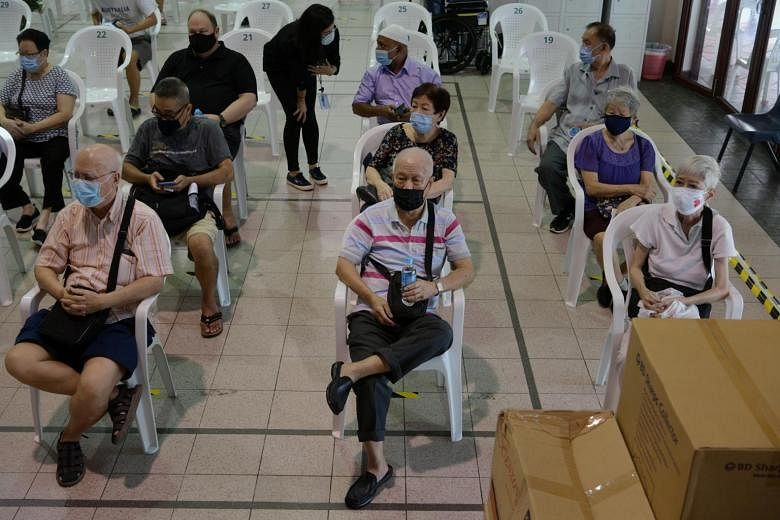SINGAPORE - There were 14 reports of suspected adverse events out of more than 230,000 booster jabs of Covid-19 vaccines given out since the national booster vaccination programme was rolled out on Sept 15.
The rate of suspected adverse events linked to the booster shots is 0.006 per cent, said the Health Sciences Authority (HSA) on Friday (Oct 15).
These reports described similar adverse events associated with the first two doses of the Pfizer-BioNTech/Comirnaty or Moderna mRNA vaccines, including rash, swelling of the eyelids, face and lips, chest discomfort, shortness of breath, fever, generalised weakness and dizziness.
There were two reports of serious adverse events (0.0008 per cent of administered doses), describing blood clots in the veins of the legs and anaphylaxis, a severe life-threatening allergic reaction.
In its sixth safety update on Covid-19 vaccines, covering the period from Dec 30 last year to Sept 30 this year, the HSA said 9,209,201 doses of the Pfizer-BioNTech and Moderna mRNA vaccines have been administered as at Sept 30 this year.
The rate of suspected adverse events linked to the Covid-19 vaccines under the national vaccination programme is 0.14 per cent, with 12,589 reports received.
The rate of serious adverse events is much lower, at 0.006 per cent, with 581 reports received.
For the Pfizer-BioNTech and Moderna vaccines, the most commonly reported symptoms include dizziness, shortness of breath, chest tightness or discomfort, palpitations, injection site reactions such as pain and swelling, fever and allergic reactions - rashes, itching, hives and swelling of the eyelids, face and lips.
These typically resolve within a few days, said HSA.
About 79 per cent of the adverse events were reported in individuals aged younger than 60. About 67 per cent of the adverse events were reported in females.
The most frequently reported serious adverse events were anaphylaxis (77 reports) and other severe allergic reactions (52 reports).
In the 12 to 18 years age group, the most commonly reported adverse events include rash, hives, swelling of the eyelids, face and lips, chest tightness or discomfort, shortness of breath, fever, dizziness and light-headedness.
Rare cases of myocarditis and pericarditis have been reported with mRNA Covid-19 vaccines both overseas and locally, said HSA.
Myocarditis is caused by the inflammation of the heart muscle, while pericarditis is caused by the inflammation of the outer lining of the heart. Both are not heart attacks.
HSA said young males aged 30 and below who received the vaccine are observed to be at higher risk of the two conditions. Most of the cases have responded well to treatment and have recovered or were discharged well from hospital, it noted.
As for the Sinovac-CoronaVac vaccine, 111 suspected adverse event reports were received after 180,903 doses were administered, which means the rate of suspected adverse events is 0.06 per cent. Nine (0.005 per cent of doses administered) of the reports were assessed as serious.
With the Sinopharm vaccine, 17,630 doses were administered, with three suspected adverse event reports received, which means an adverse event rate of 0.02 per cent. No serious adverse events were reported with the Sinopharm vaccine.
The HSA said the type and number of reports received for different Covid-19 vaccines are not directly comparable as the vaccines have been used in the vaccination programme for different durations of time.
In addition, the Sinovac and Sinopharm vaccines have been administered only to a very small proportion (less than 2 per cent) of the population, compared with the much larger scale of deployment for the mRNA vaccines, it noted.
Based on the data to date, the benefits of the Pfizer-BioNTech and Moderna vaccines continue to outweigh the known risks in a pandemic, said HSA. It added that it will continue to closely monitor the safety profile of Covid-19 vaccines.


